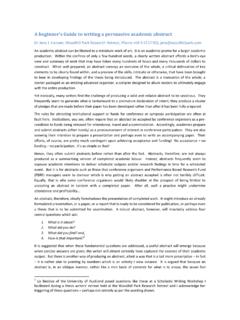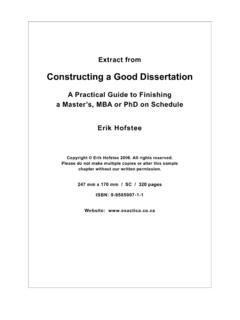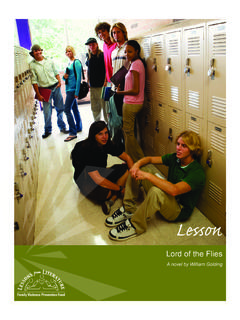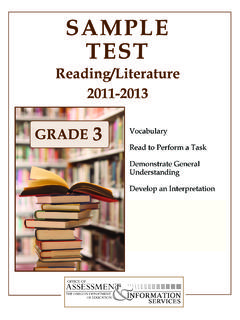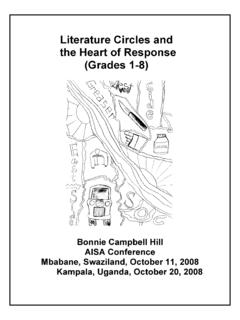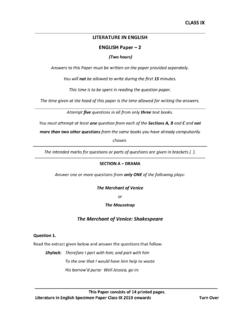Transcription of Critiquing Reviewed Literature - Woodhill Park Retreat
1 Slide 1. Critiquing Reviewed Literature Dr Jens J. Hansen Dr Richard Smith In our experience, encountering a poorly constructed and generally uncritical Literature review remains an all too common flaw in postgraduate theses and research dissertations. The norm appears to be one of supervisors, wisely in our view, advising candidates to peruse the Literature ' in order to discover what, if anything, others have written about the topic area that the student is contemplating for their investigation. Typically, students then begin to amass discursive data which they then report upon in preparing an uncritical but generally fastidiously detailed Literature chapter. They work hard at what they do.
2 And then, sometime before their opus magnificus is to be submitted for final examination, the postgraduate candidate discovers that their work is not considered by their supervisor to be of a satisfactory standard and they, along with their supervisors, are left feeling frustrated and bewildered. Rightly or wrongly, candidates feel perturbed and perplexed that their supervisor has not provided earlier sound guidance about the Literature review; rightly or wrongly, supervisors are bothered and baffled that their proteg has not performed to an examinable standard! There almost seems to be an inevitability about this phenomenon and while these notes are unlikely to arrest all but the rarest of instances of frustration about developing a critical Literature review, it is hoped that they can begin to help postgraduate candidates appreciate the importance of developing a critical Literature review.
3 After all, it remains true that Literature which initially informs, challenges or extends research, in turn becomes a part of the Literature of future research. So it is worth doing well. Slide 2. This session focuses on . 1. Adding the element of critique to Literature Reviewed . Let s discuss why 2. Understanding that crafting the critique goes hand-in-hand with assembling a Literature review. Let s look at how 3. Applying these foci to the topic of your choice and gaining critical reviews and peer feedback Our objectives for this workshop sessions are quite straightforward and need no amplification. We reason that at this level, it is fair to expect you to assume a professional approach to honing your scholastic skills.
4 We'd like you to take up three challenges, each of which will help you to achieve our aims for this session. The first is to critically examine Literature reviews that have been completed by other writers so that you may discern what the characteristics of a sound Literature review might be. You should inspect what others have written with a critical eye so that you learn to distinguish between a well crafted and critical review and an engagingly written but uncritical report on who said what and when. Emulate the first and become informed by the second. The second challenge is to trawl selectively through the masses of resources that have been developed on this matter by armies of academics at countless universities across each of the continents.
5 There are far too many to ever read fully but there is merit in superficially casting discerning eyes and an enquiring mind over a sample of resources. That way, you might pick up ideas about common threads and you might even discover a site or three that is worthy of a detailed rummage! The third challenge is to become a discerning collector of well constructed turns of phrase. The test is to recognise when something has been unambiguously and simply written so it conveys a message with precision and intensity. The challenge is not to copy such morsels, but to emulate the manner in which they were presented. A well crafted and critical Literature review requires you to demonstrate clear and careful thinking about dialogues pertaining to your investigation.
6 You must captivate your reader when you share your engagement with ideas, thoughts and understandings in your critical Literature review. Slide 3. Ponder these points . What does Critiquing the Literature mean? What processes are involved? What criteria/arguments will you advance for your critical Literature review? How do you know that your reading of the material of others, is reliable? How do you know their work is sound? How do you know you have achieved a critical Literature review? The questions in this slide are neither exhaustive nor are they hugely deep. They do, however, span what we consider to be some essential questions that you need to think about whilst you are developing a critical Literature review.
7 Irrespective of the issue, or question or hypothesis that you are contemplating an exploration of, the fact remains that there are some fundamental scholastic processes that you will have to complete. You will need to gather, manage, analyse, and think about the data you work with. You will also need to formulate effective ways of presenting your work. But remember that although the theoretical parameters of your chosen topic hold at least some jurisdiction over the shape of the arguments you will address, whatever you eventually propose when you develop your critique of work that has been completed (or overlooked) by others, remain uniquely yours. So our advice to you is to aim to make your work clear, simple and insightful, and to make it memorable because of the simplicity, the clarity and the astuteness you have achieved in your critique.
8 Slide 4. Stating the obvious . If all research answers were able to be found in Literature , there would be little incentive to conduct further research;. But that is not the case and so Literature informs novice and veteran investigators alike about aspects of the issue to be explored;. Informative data may be mined from many sources. The first claim in this slide blithely proposes that if all research answers were able to be found in the Literature , there would be little incentive to conduct further research. But just how reasonable is such a claim? We contend that there are some difficulties to sort out here. First, it should be noted that it is most unlikely that all research answers will ever be found in the Literature achieving such a state of knowledge would be on a par to demonstrating metaphysical assumptions!
9 Second, we note that not knowing everything, and realising that we do not know everything, provides a thrilling aspect of research. And of course we don't always know what we don't know and finding out about that is in itself an incentive to conduct research whether we are novices or Which leads us to comment on the second conjecture in this slide namely that Literature has the potential to inform both novice and veteran investigators about aspects of the issue to be explored. Providing, that is, that they are critical! Any investigator who unquestioningly accepts whatever the Literature says is, frankly, unlikely to succeed in scholarship. Ideas are dynamic. They evolve as knowledge and understanding compound.
10 If they did not, we would probably still think that the earth was flat and that the sun travels in a circle around the world. Our point is made. Finally, we note that informative data may be mined from many sources. But it may also be necessary to make inferences from other data, or even, from the absence of data. Research is seldom linear and qualitative research in particular is a messy business; it acknowledges many, many, often interacting, variables. Hence, it stands to reason that Literature about messy research is unlikely to be neat and tidy even if it reads in an orderly fashion. Thus for qualitative research, just as with quantitative research, our advice to you is to mine Literature from any source you can tap into but take nothing for granted.
